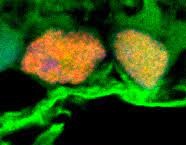Bone injuries and diseases can be debilitating and difficult to treat, but a new breakthrough in nanobiotechnology may change that. Researchers have developed a novel delivery system using engineered miR-181b exosomes that has shown promise in improving osteointegration.
Osteointegration is the process by which a bone implant, such as a joint replacement or dental implant, fuses with the surrounding bone tissue. This is crucial for the long-term success of the implant, but can be hindered by factors such as inflammation and poor blood supply.
Nanobiotechnology has been making waves in the medical field with its ability to improve the delivery of therapeutics to specific cells and tissues in the body. A recent study has revealed a novel delivery method using engineered exosomes that contain microRNA (miR-181b) to improve osteointegration, the process by which bone tissue attaches to a newly placed implant.
The study found that by delivering miR-181b via exosomes to the site of implantation, it was able to regulate macrophage polarization and promote the formation of new bone tissue. Macrophages are immune cells that play a key role in the body's healing process and can be either pro-inflammatory or pro-healing, depending on their "polarization" state.

This article was publish in Journal of Nanobiotechnology under title "A novel delivery nanobiotechnology: engineered miR-181b exosomes improved osteointegration by regulating macrophage polarization"
The researchers used a technique called "exosome engineering" to package miR-181b within exosomes, small vesicles that are naturally secreted by cells. Exosomes are able to cross biological barriers and reach specific cells and tissues, making them an ideal vehicle for delivering therapeutics.
The study was conducted on rats and the results showed that the engineered exosomes containing miR-181b were able to significantly improve osteointegration compared to control groups. The treated rats also had a greater number of pro-healing macrophages at the implant site, indicating that miR-181b was able to successfully regulate the polarization of these cells.
This study presents a promising new approach for improving the success of implant surgery by utilizing nanobiotechnology to enhance the body's natural healing process. The use of exosomes as a delivery vehicle allows for targeted delivery of therapeutics to specific cells and tissues, while the regulation of macrophage polarization promotes the formation of new bone tissue.
This research open new opportunity for the medical field, especially in the orthopedic and dental field, where osteointegration is crucial for the success of implant surgeries. Furthermore, the exosome engineering technology has the potential to be used for other therapeutic applications, such as cancer and regenerative medicine.
It is important to note that this study was conducted on animals and more research is needed before the safety and efficacy of this approach can be confirmed in humans. However, the results of this study hold significant promise for the future of implant surgery and the use of nanobiotechnology in medicine.
In summary, this Research highlights the potential for exosome engineering technology in the medical field. This study shows the ability of the engineered exosomes containing miR-181b to significantly improve osteointegration and promote the formation of new bone tissue by regulating macrophage polarization. This is a promising approach for the future of implant surgery and the use of nanobiotechnology in medicine.






_underway_during_sea_trials_on_11_May_2017.jpg)

0 Comments
Feedback will be Appreciated